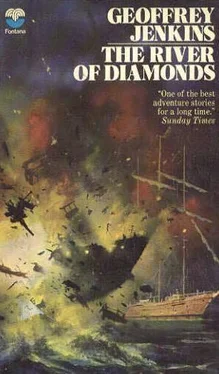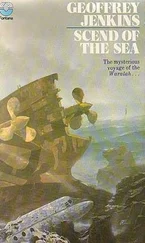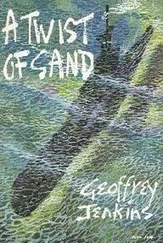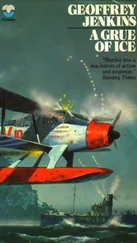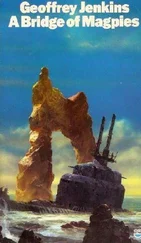Geoffrey Jenkins - The River of Diamonds
Здесь есть возможность читать онлайн «Geoffrey Jenkins - The River of Diamonds» весь текст электронной книги совершенно бесплатно (целиком полную версию без сокращений). В некоторых случаях можно слушать аудио, скачать через торрент в формате fb2 и присутствует краткое содержание. Жанр: Морские приключения, на английском языке. Описание произведения, (предисловие) а так же отзывы посетителей доступны на портале библиотеки ЛибКат.
- Название:The River of Diamonds
- Автор:
- Жанр:
- Год:неизвестен
- ISBN:нет данных
- Рейтинг книги:4 / 5. Голосов: 1
-
Избранное:Добавить в избранное
- Отзывы:
-
Ваша оценка:
- 80
- 1
- 2
- 3
- 4
- 5
The River of Diamonds: краткое содержание, описание и аннотация
Предлагаем к чтению аннотацию, описание, краткое содержание или предисловие (зависит от того, что написал сам автор книги «The River of Diamonds»). Если вы не нашли необходимую информацию о книге — напишите в комментариях, мы постараемся отыскать её.
The River of Diamonds — читать онлайн бесплатно полную книгу (весь текст) целиком
Ниже представлен текст книги, разбитый по страницам. Система сохранения места последней прочитанной страницы, позволяет с удобством читать онлайн бесплатно книгу «The River of Diamonds», без необходимости каждый раз заново искать на чём Вы остановились. Поставьте закладку, и сможете в любой момент перейти на страницу, на которой закончили чтение.
Интервал:
Закладка:
Geoffrey Jenkins
The River of Diamonds
1
'East of the sea and west of the dunes.'
Whether it was the Miltonics inherent in the phrase which came so spontaneously from the lips of the tall man in the witness-box, or the chance ending of the tape-recording spool which underlined and gave weight to what he said, I am not sure; but I know that in my own mind I date the fate of the Mazy Zed from that instant.
I have read the court transcript since in order to be able to delineate, not chronologically but in its proper perspective, the figure which emerged as our enterprise progressed; I prevailed upon the authorities to give me the actual recording of his words, and it is now revolving slowly on my desk as I write. I still find in his educated, resonant English voice an indication of the well-springs of that drive which made him for so long an outlaw — in his own mind at least — from his friends, from the fellow prospectors who admired his work and hoped to avoid his fate, and most, God knows, from his family. It is easy, therefore, for me to set down exactly what he said, and although the picture of him that I give is taken from my mind's eye, that impress is no less strong upon me than upon anyone else with whom he came in contact. The sea and the dunes — those two were so much part of the man that my narrative starts naturally from the point at which he spoke of them to the court.
Fred Shelborne stood before the microphone at the end of the courtroom farther from the Judge and two assessors. Mr Justice de Villiers presided at the head of a horseshoe-shaped table; Younger and du Plessis, both barristers and diamond experts, flanked him. Their table was on a dais and below, at floor level, there was a double row of other tables, covered in green plastic, for counsel. The witness-box was between the two rows, so that Shelborne faced the whole room. Outside the door at his back was a lawn and bushes, as incongruously green as was the diamond town itself among the desert dunes. A green pattern of lawns and bright cottages, with a swimming-pool and red-steepled church, lay branded, man-made, on the ochre surface of this, the richest diamond field in the world.
Shelborne was not on trial: the Government had set up a special court at Oranjemund, the only town of the Sperrgebiet, the forbidden diamond coast of South-west Africa, to hear the most radical prospecting application in the history of mining.
We wanted to mine diamonds from the sea.
We asked for the right to prospect for 250 miles along the Sperrgebiet from a point roughly 450 miles north of Cape Town. Along this savage, treacherous and mainly unexplored littoral lie a dozen small islands, close off shore, which are covered with the droppings of millions of seabirds — the 'white gold' of guano.
We had come to Oranjemund from Cape Town, 370 miles to the south, well prepared for our case. Presenting our application were three leading barristers, with supporting juniors. We had expected opposition — in the diamond game there are always the old-timers to stake a preposterous claim. Shelborne looked like one of them: an old sports jacket, shirt washed to the colour of bleached driftwood, blue trousers pale with wear, the ghost of some once-fashionable club in his tie's Windsor knot.
He repeated, as the new recording spool started to spin: 'East of the sea and west of the dunes.'
He coughed, not apologetically, but asthmatically.
Shardelow, the Queen's Counsel leading our legal team, misjudged him as much as I had at first glance.
'Mr Shelborne,' he said with studied patience, 'please answer my question. I asked, were you aware of the existence of a so-called treasure trove of diamonds on the Sperrgebiet coast in a place known euphemistically as "the Hottentots' Paradise". You replied, yes. I asked where it was. Your reply is, "east of the sea and west of the dunes".'
Shelborne's air of preoccupation was intense. 'That is correct.'
Shardelow fiddled with some papers and flicked a glance at the Judge. He was fine-drawn, sallow, with a high forehead and slicked-back hair. It was a face from an old Flemish master.
'Mr Shelborne, I see here you hold a master mariner's certificate?'
'In sail.'
'That presupposes a knowledge of navigation?'
'Naturally.'
'Assume you are on the deck of your windjammer — making your way along the coast of South-west Africa…'
'Yes.'
'You are about to enter an unknown harbour…'
'There are no unknown harbours. There is only one port between Oranjemund and Walvis Bay — Luderitz.'
'We are theorizing, Mr Shelborne. For the sake of my analogy, grant me an unknown harbour on the Sperrgebiet.'
Shelborne nodded. There was not a single hair on his head. Its domed smoothness contrasted with the deep gullies round his nose and eyes.
'Your first mate says the harbour entrance lies "east of the sea and west of the dunes". You would consider that definite enough to pinpoint the entrance — specific, exact navigational indications?'
'No.'
'Yet you feel you can state — under oath too — to this court that the locality of the Hottentots' Paradise, this nirvana where there are all the diamonds and all the girls to be had for the taking, is known to you; and that it lies east of the sea and west of the dunes?'
'Yes.'
'Perhaps you would explain?'
'A harbour entrance could be half a mile wide, it could be a couple of hundred yards. I am talking about a desert 100 miles wide. On the west is the sea and on the east the dunes. Somewhere between the two lies the Hottentots' Paradise.'
'You are sure it exists?'
'When I was first in the Sperrgebiet nearly fifty years ago, several expeditions set out to find it. None came back.'
'What, in your opinion, prevented their returning, Mr Shelborne — the diamonds or the dancing girls?'
A snigger ran round the court. A barrister at the table opposite me leaned forward and scribbled on his pad. His movement revealed a young woman sitting behind him. Unlike the others, she was not smiling: she stared at Shelborne.
Shelborne rode the wisecrack. 'Neither. The desert did.'
The deep resonant voice is there in the recording still, but the tape does not capture the curious air of preoccupied dedication which put paid to Shardelow's humour. From that moment he knew he was crossing swords with a man of calibre.
Shelborne went on: 'They adventured into a terrible wilderness of dunes which, to this day, has never been explored. The Namib is the most savage desert in the world.'
'Come, come, Mr Shelborne — the most savage in the world? There are other deserts, you know.'
'I know. The Namib is small — about one-thirtieth the size of the Sahara. It is older than any other — the Gobi, the Rub' al-Khali in Arabia, the Mohave in North America, the Takla Makan in Turkestan. When the earth's crust solidified, it did so first along the coast of South-west Africa. The Namib was born. The only other desert which in some way resembles it is the Atacama coastal desert of South America. But the Atacama is a mild, comfortable place compared to the Namib…'
Shardelow hitched his gown round his shoulders. 'You have some extraordinary attributes for a simple prospector, Mr Shelborne. Your range seems to include even the second day of the Creation.'
Shelborne smiled. 'The third day, I think. Dry land emerged out of chaos on the third day.'
The Judge smiled too. It was the sort of thrust which appealed to his cool mind.
Shardelow glowered. 'Now, Mr Shelborne: you have just named the… ah…' he consulted a scrap of paper handed to him by his junior counsel '… the Atacama desert in South America and the… ah… Takla Makan in Turkestan.' He turned to the bench. 'I am sure, my lord, that if I had had the prior opportunity of consulting the Encyclopaedia Britannica, I, too, could have adduced these names…'
Читать дальшеИнтервал:
Закладка:
Похожие книги на «The River of Diamonds»
Представляем Вашему вниманию похожие книги на «The River of Diamonds» списком для выбора. Мы отобрали схожую по названию и смыслу литературу в надежде предоставить читателям больше вариантов отыскать новые, интересные, ещё непрочитанные произведения.
Обсуждение, отзывы о книге «The River of Diamonds» и просто собственные мнения читателей. Оставьте ваши комментарии, напишите, что Вы думаете о произведении, его смысле или главных героях. Укажите что конкретно понравилось, а что нет, и почему Вы так считаете.
